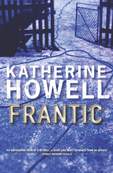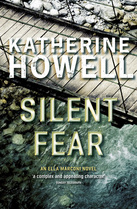Katherine
Howell was once told that her manuscript lacked suspense. She promptly studied
the subject for her Masters degree, and now rereads her thesis when she starts each
new book, to remind herself of the techniques of developing suspense in
fiction. Katherine was a paramedic in the ambulance service for 15 years. She
writes high-adrenaline tales of murder and intrigue, has twice won the Davitt
Award for best novel, and her novels are published in many countries and
languages.
Today, she's talking about finding the right protagonist.
My first
novel, Frantic, was published in Australia in 2007 and features police
detective Ella Marconi alongside paramedics. It’s since been followed by three
more novels, with the fifth in the series, Silent Fear, due for release
in February. Each continues the angle of using paramedics as protagonists,
something that not only provides a point of difference for the books but also
draws on my experience of doing that job for fifteen years.

I’m often
asked about the process of turning that real-life experience into fiction and I
always answer that it wasn’t easy. I initially resisted the idea completely,
and instead wrote bottom-drawer manuscripts about - variously - cults, forensic
science students, and cops chasing a killer while being assisted by a ghost.
When I did start to recognise the drama and inherent story value in the world I
worked in, my first attempts to put any of it on paper overflowed with my grief
and anger about the situations I faced daily and the people I tried to save. It
took counselling and my eventual resignation to manage these emotions, and even
then it was months before they disappeared completely from my writing. Once
that happened, however, I was faced with the next problem: how to use these
paramedic stories in the procedural crime series I was determined to write.
I’d wanted
to have a paramedic as my protagonist, but I couldn’t see how to have her
plausibly solving crime, and I had no clue what could then happen in the next
book. I came to realise that I needed a police detective; a scary thought at
first, because my reason for using the ghost in that earlier ms was because of
the difficulty in learning the details of how exactly police solve a particular
crime. Even when I started researching, I felt a huge gap in my knowledge—I
knew the paramedic’s world so well, it seemed wrong to not have the same
understanding of the detective’s. I wanted to be true to these jobs, and to not
know it all made me think I couldn’t do it justice. I saw, however, how many
crime novels are written by non-cops (ie, most of them), and decided I had to
at least give it a try, being as true along the way as I could.

This then
brought up another problem: to me, being true to the job of paramedic meant
putting in every moment of a case, every question and answer, every action, every
step of treatment. But as my manuscript grew longer, with scenes rolling on
interminably for pages, I realised this wouldn’t work. I reread some of my
favourite crime novels, analysed how the authors delivered information, and saw
that I needed verisimilitude rather than total adherence to the facts. The
real-life details were like a garnish, to be sprinkled in here and there to add
flavour and impact. Too much of it overwhelmed the most important element of
all, the reason people pick up a book: story.
I went back
to the start of the manuscript and changed how I incorporated my experiences,
and finally saw the work come alive. Months of hard work later, and a year
after I quit that job, the ms sold as part of a two book deal to Pan Macmillan,
and as I write now I keep the ideas of ‘detail is garnish’ and ‘story is king’
foremost in my mind.
Thanks, Katherine – I guess the right protagonist isn't necessarily the one you know inside out. Katherine's site: http://www.katherinehowell.com/
- For more about me and my books: http://www.ian-irvine.com/
- To say Hi or talk to me about books and writing: http://www.facebook.com/ianirvine.author
- To follow me on Twitter: http://twitter.com/#!/ianirvineauthor
- My blog about the novels I write, and the writing life: http://ian-irvine.blogspot.com/

No comments:
Post a Comment